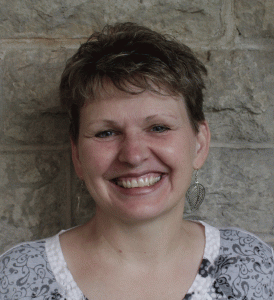CSOP Participant Profile – Terry Schalm

by Ellen Paulley
Peacebuilding: Beyond Dealing With War
Terry Schalm, wife of a Lieutenant Colonel in the Royal Canadian Air Force, has learned alternative models of peacemaking while studying at the Canadian School of Peacebuilding (CSOP).
Schalm says that the approaches she’s learned at CSOP have been eye opening and that she’s learned “there are different ways of doing things without using force.” An institute of Canadian Mennonite University, CSOP is a community of diverse peacebuilders who come together to learn, network and engage in peacebuilding.
Schalm, who is also a student at CMU, says her education at CSOP and CMU has expanded her understanding of peacebuilding. “It’s not just preventing violence,” she says. “Peacebuilding is so much more than dealing with war. It’s building communities, building harmony, and seeing value and dignity in everyone.”
While Schalm says she finds value and truth in nonviolent peacebuilding, she says she hasn’t “been converted over yet.” She grapples with whether nonviolent action could be sufficient to “deal with leaderships and attitudes in some countries.”
She also ponders what changes would be required in order for nonviolent peacebuilding to become the norm. She says it will likely take the intentional efforts and substantial cooperation of many people for the world to move in the direction of peacebuilding and wonders whether “we’re committed to continue in a military fashion with our western thinking.”
But the idea that peacebuilding occurs at the local and individual level gives Schalm hope – “it all starts with individuals and moving toward [peacebuilding] and facilitating that growth over time.” She says her time at CSOP has taught her that even actions like compassionate listening can bring about peace.
Hearing other perspectives was a highlight of the CSOP class Schalm took this year, “Strategies for Trauma Awareness and Resilience,” taught by Elaine Zook Barge. “It was really helpful to hear what life is really like for those who have experienced trauma, not just what we imagine or hear in the media,” says Schalm.
In the future, Schalm would like to work in the area of mediation and says what she’s learned during this course will be very applicable. Through her time at CSOP, she’s grown in her awareness that “each person comes with a story and that each person should be entitled to voice their story with respect.”
Because of her husband’s 38 years of service with the RCAF, Schalm says she wasn’t initially sure if she’d be welcomed at CSOP, but comments that the diverse makeup of the School means that everyone is given a voice and is validated. “Instructors seem open to sharing their stories and lives with you and likewise are willing to listen to your story,” she says.
Schalm’s looking forward to talking with her husband about the concepts and approaches she’s learned. And while she might not yet be “converted,” her time at CSOP has “softened my attitude that the military way is the only way,” she says. “Maybe there is hope for people in leadership—that their hearts can be softened too.”







